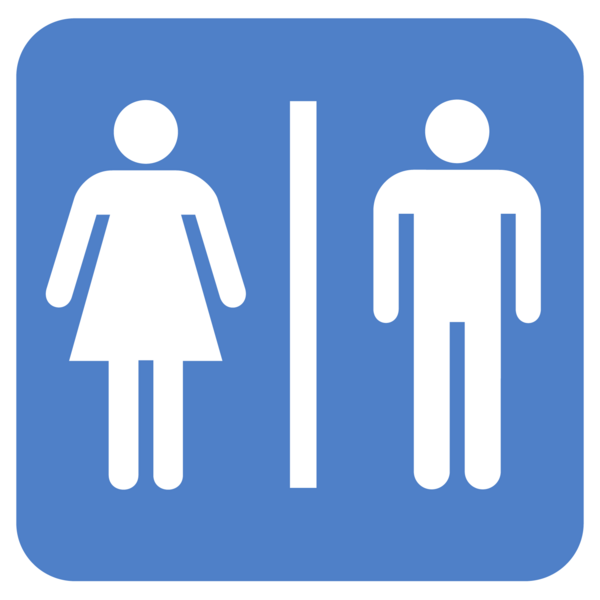Yep, that's right, I'm gonna talk about something that you probably think is a no-brainer, but is actually incredibly nuanced and complicated.
Gender is such a complex topic that I feel like I'm not necessarily qualified to talk about it. But for many people, I may be the first resource, the first step into the colorful world of Gender Understanding. So let's just get right into it because there's a lot (and I mean a LOT) to cover.
If you don't like lots of words, I've linked to some videos at the bottom of the post. Check out the postscript.
In Western culture, we're taught from a young age that what's in your pants corresponds to a whole host of things, such as how you view yourself, how you dress, how you act, and who you date. When the baby shows up on the ultrasound or when they're born, the doctor smiles and says one of two things: "It's a boy," or "It's a girl". How does the doctor know this? By looking at the infant's junk.
For many of us, that's the end of the story. We grow up being called a boy or a girl and we're like "Yep, that's accurate". Maybe we end up dressing differently from what boys and girls are "supposed" to dress like, maybe this girl acts more "manly" and that guy more "femmey," but for the most part we identify with the gender assigned to us.
Hopefully by now you're aware that that isn't the case for everyone. You've probably heard about Jenna Talackova, the beauty queen who was barred from Miss Universe Canada because she had been born male. If you're old enough you remember the child of Sonny Bono and Cher coming out as a man, taking the name Chaz, and causing controversy by existing in public in the form of a TV show. If you're a film person, you probably noticed that one of the makers of The Matrix now has pink dreadlocks and breasts, things they didn't have when The Matrix came out. These people all have something in common: they are transgender.
I now have to backtrack because I know a lot of people don't even know what being transgender actually means. So. Let's go to the beginning.
SEX
The way the doctor assigns your gender is based on your sex, which manifests most obviously in your genitalia. If you have a penis and a scrotum, you're male; if you have a vulva, you're female*. Your sex at birth is determined by your chromosomes, which are usually XX (female) or XY (male). One in every 2000 births, however, produces a child who is neither unambiguously male nor unambiguously female. The baby may seem female except for a clitoris so large it looks like a small penis, or the baby may have both a vulva and a penis, or the baby may appear one sex but have the chromosomes and some of the parts of the "opposite" sex**.
What's the usual response? Well, as long as surgery's been safe for infants, the solution in some cases was to remove the male genitals (if the baby had both) and instruct the parents to raise the baby as a girl. In other cases the attitude seems to have been "ignore it and it'll go away". Anything to make the baby either a girl or a boy so they're not ostracized, or a freak, or whatever. More and more, though, there's a growing movement to respect the body the baby was born with until they decide what's to be done with it. There's even a name for these kids: intersex. You were thinking it's "hermaphrodite," right? Yeah, that's not a good word to use, anymore. Intersex people have named themselves and those of us who are unambiguously male or female should respect that.
So, what we have now are more than two sexes. Indeed, the number of possible sexes is pretty big, but in general they are identified as male, female, and intersex.
To review:
- Male: Possessing of a penis and scrotum
- Female: Possessing of a vulva, labia, clitoris, vagina
- Intersex: Any combination of those, lacking both, etc.; possessing of ambiguous genitalia
What intersex people can teach the rest of us is that your sex does not determine your gender. "But they're the same thing!" I hear you say? Let's move on.
 |
| It's a lot to absorb, I know. Please stare at this puppy while you process. |
GENDER IDENTITY
First of all, no, they're not the same thing. As I just said, intersex people are proof that your sex does not determine your gender. If it did, we could tell who was intersex right away; they'd all be something other than a man or a woman.
Gender identity is a difficult thing to define, but the best stab I can take at it is that it's one's sense of being a man, woman, or something else.
Yep, something else. I told you this is complicated.
Many of us identify with the gender we're assigned based on our sex. I'm female, the doctor told my parents I was a girl, and I identify (strongly) as a woman. There's a word for us in this situation, and that word doesn't happen to be "normal". I'm what's called cisgender, and most people would find that that's the accurate term for them, as well.
For a significant number of people, however, that's not the case. The doctor looked at their genitals and said "It's a boy" but sooner or later that child realized that when people talk about boys, they're not talking about that child, at least as far as they're aware. Maybe they identify more with their little sister, or maybe some days they feel more like a boy and other days more like a girl, or maybe they don't feel like anything.
In all of these scenarios, the child could be described as trans. This is usually short of transgender and is used for a wide variety of gender identities; you'll hear people talk about the transgender umbrella:
Most often, however, you'll hear people refer to transgender people as separate from other genders which are technically also trans, so lately you'll see transgender and transsexual used interchangeably, and the general umbrella term is trans or trans* (the asterisk indicating the variety of identities encompassed by that term.
But what does it mean? What are all of those scary words under the brightly-colored umbrella?
Let's take this one at a time. From the people I've met and from the things I've read, these are the most common gender identities which are wrapped up in the package labelled "Trans" (huge disclaimer: I'm not trans at all, so I'm only speaking as an outsider looking in. Use me as a starting place and then go out and talk to actual trans people):
In all of these scenarios, the child could be described as trans. This is usually short of transgender and is used for a wide variety of gender identities; you'll hear people talk about the transgender umbrella:
 |
| PFLAG Phoenix |
But what does it mean? What are all of those scary words under the brightly-colored umbrella?
Let's take this one at a time. From the people I've met and from the things I've read, these are the most common gender identities which are wrapped up in the package labelled "Trans" (huge disclaimer: I'm not trans at all, so I'm only speaking as an outsider looking in. Use me as a starting place and then go out and talk to actual trans people):
- Transgender/transsexual: Not to be confused with "transvestite," a transsexual person is someone who feels their body doesn't adequately reflect who they are, on a very fundamental level. They may undergo hormone replacement therapy (HRT) and/or get surgery to alter their body from male to female or vice versa. Most often, transsexual people identify as a man or a woman, but this isn't always the case. The important thing is that their body as it was at birth is the source of a lot (a lot) of pain, and the only way to ease that pain is modifying it; this is what differentiates the surgeries from cosmetic plastic surgery. A transman is a female-assigned person who identifies as a man, and a transwoman is a male-assigned person who identifies as a woman.
- Bigender: A bigender person is someone who identifies as both a man and a woman. Maybe one day they feel like a man and the next a woman, or maybe they're in a constant state of being both, but they aren't pinned down to just "one" or "the other".
- Gender-fluid: A person who is gender-fluid is also more free-flowing than a cisgender person, but they're less likely to identify as all-man or all-woman on any given day. If Man and Woman were sides in a game of Pong, Gender-Fluid Person would be the ball, touching on either side but spending most of their time in the grey area in between, moving around. The key to gender-fluidity is just that, its fluidity. I've seen it referred to as a "dynamic" gender identity, because on any given day you don't know how the person's going to identify.
- Genderqueer: This is an umbrella term within the trans umbrella, used to refer to people who don't identify as strictly men or strictly women (this is known as the gender binary); some people may identify their gender identity as just "genderqueer," but it can also encompass more specific identities, such as bigender or gender-fluid or...
- Agender: This person doesn't identify as a man, a woman, a mix of the two, anything. They just aren't any gender. Kinda mind-blowing, right? Well, these people exist.
- Two-Spirit: This is the English phrase for a gender identity that goes by a variety of names, depending on which tribe you're talking to. "Two-Spirit" is a gender identity specific to certain Native American cultures, where some people were believed to possess both the spirit of a man and a woman, and accordingly performed both male and female tasks and had freedom to wear either male or female clothes. They were not stigmatized, and in fact were considered very special in their tribes.
I'll let my various trans-identified friends let me know if I got something wrong or left something out.
Before moving on, three quick things I want to stress: first, ask a person what pronouns they want you to use to refer to them; don't make assumptions and don't decide for them what pronouns are "appropriate". Second, no one really knows where gender comes from, but I can offer my thoughts on the subject based on my understanding. In order to keep things on track, I'll cover the science of gender on my Tumblr here. Third, transsexual people may still not identify as a man or a woman. They may identify as, say, a female agender person, and take hormones and get surgery to reflect the female part of them while expressing themselves as genderless. Which leads us conveniently into...
GENDER EXPRESSION
This is a bit less complicated than gender identity or sex, because I don't have to try to tell you how people think or feel.
Wait, I got a headache just from writing everything that came before. Have another puppy.
Moving right along.
Gender expression is how a person dresses themself, acts, talks, etc. Some people refer to this as the performative aspect of gender, which kind of makes sense, but I'm not a fan of it because it implies that it's fake, a performance, when I can tell you from experience that gender expression can be incredibly important, as well.
There's an infinite number of ways to express your gender identity, but I think there can be four main "categories" of gender expression:
- Masculine
- Feminine
- Androgynous/Genderfuck***
Women can be masculine, men can be feminine, anyone can be androgynous (mixing of masculine and feminine until you can't tell what's what) or genderfuck (intentional play with conventions of gender). Heck, anyone can express their gender in any way. I know of a young man who was designated female at birth (DFAB), identifies as a man, but has a more feminine gender expression. I personally prefer to express my gender in a more feminine way, which is why everyone's always surprised when I come out to them as a lesbian because they think lesbians are always "manlier" than straight women. The one time I tried to change my gender expression to masculine (by putting on male drag), I was miserable after spending a whole day like that. Though I did look pretty good:
 |
| Hey, sexy. |
BRINGING IT ALL HOME
What I struggle with whenever I explain sex and gender to people is that we all think we know what's up with both. If you have a penis, you're a man. If you have a vagina, you're a woman. When asked for your gender on a form, you check M or F.
This is a mistake. Humanity refuses to be put into binaries or boxes. There is no either/or. Heck, I can't say "the opposite sex" anymore because it begs the question, opposite of what? Having a non-binary understanding of gender and sex can, I think, actually be beneficial, because it removes the inherent sense of male being "opposed" to female, like it's a battle. Instead, there's male, female, intersex, all equal to each other. Instead of men being from Mars and women being from Venus, we have man, woman, bigender, agender, genderqueer.
Diversity can be overwhelming, especially in a case like this where the English language has formed so perfectly around the idea that sex and gender are binary, because suddenly you realize things like addressing a mixed-gender group of people as "guys" is inaccurate (and potentially triggering to some transwomen, as my friends' stories have indicated). All I can say is take your time and learn. The world actually becomes a much more open, fun, and interesting place when you allow for diversity. Suddenly you find yourself admiring skirts with a person who identifies as a man but prefers feminine clothing, or arranging for friends of different genders to receive secondhand breast-binders.
Some people think that trans folks are just mentally ill and need medication, therapy, or prayer to get them to be content with their bodies. All I can say is I have several people in my life whom I love who would most likely say "Yeah, no". Maybe those people need to be reminded that most credible psychiatrists and therapists now say that the best way to deal with the emotional issues which accompany being transsexual is to... wait for it... change their bodies to fit their mind's perception.
Or they could take the trans person's word for it and mind their own business. That works too.
Diversity can be overwhelming, especially in a case like this where the English language has formed so perfectly around the idea that sex and gender are binary, because suddenly you realize things like addressing a mixed-gender group of people as "guys" is inaccurate (and potentially triggering to some transwomen, as my friends' stories have indicated). All I can say is take your time and learn. The world actually becomes a much more open, fun, and interesting place when you allow for diversity. Suddenly you find yourself admiring skirts with a person who identifies as a man but prefers feminine clothing, or arranging for friends of different genders to receive secondhand breast-binders.
Some people think that trans folks are just mentally ill and need medication, therapy, or prayer to get them to be content with their bodies. All I can say is I have several people in my life whom I love who would most likely say "Yeah, no". Maybe those people need to be reminded that most credible psychiatrists and therapists now say that the best way to deal with the emotional issues which accompany being transsexual is to... wait for it... change their bodies to fit their mind's perception.
Or they could take the trans person's word for it and mind their own business. That works too.
This post was a challenge to write, and I generally know what I'm talking about here. If you don't understand anything, feel free to re-read and/or ask me questions. If I can't answer the questions, my friends probably can. I encourage you to do your own research into these issues and spread this post around, because the T in LGBT hasn't gotten as much love as the other letters, and that needs to change.
Thanks for sticking with this post; I know it was a long one. Until next time!
P.S. Hank Green and Laci Green (not related) have both done excellent videos on sex and gender.
*Do me a favor and please don't get twitchy about my using the medically accurate term for body parts.
**Bear with me, I'll address why I put "opposite" in quotes.
***Sorry, Mom.


As always, well thought out and researched. Good job!
ReplyDelete